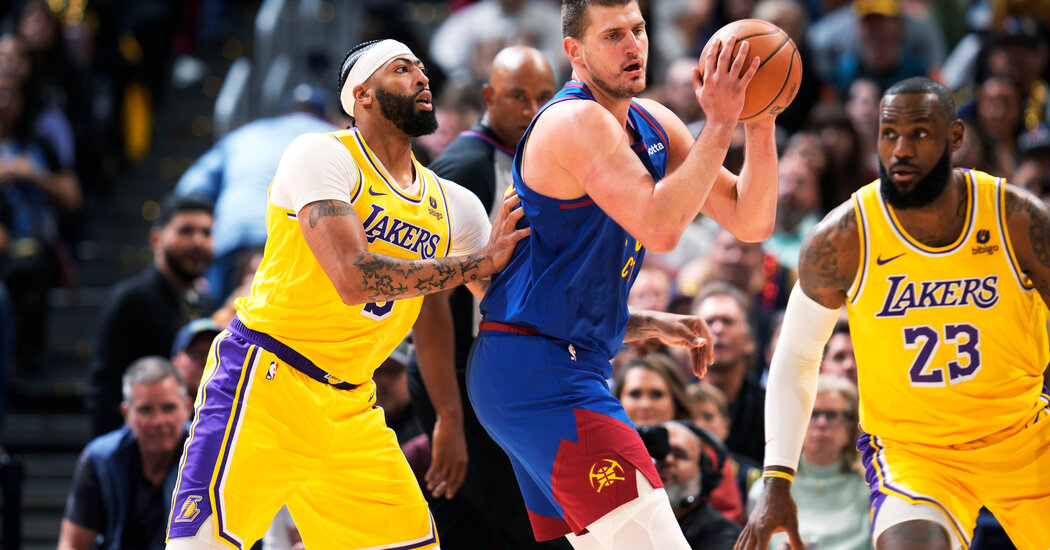Sports
Tug-of-War Over N.B.A. Rights Provides Glimpse of Media's Future – The New York Times

Advertisement
Supported by
The league’s longtime television partners, including ESPN and Turner, are undergoing major changes, which could alter how games are watched.
Kevin Draper and
The National Basketball Association’s season tipped off on Tuesday with stars like LeBron James and Nikola Jokic beginning the long quest for a title. But the action that will have longer-term ramifications for the league, and the media and entertainment landscape, is happening off the court.
The companies holding the rights to show N.B.A. games — Disney, which owns ESPN and ABC, and Warner Bros. Discovery, the parent company of TNT — are collectively paying the league $24 billion over nine years for that privilege. But their contracts expire after next season, and the N.B.A. hopes to more than double the money it receives for rights in the next deal, according to several people familiar with the league’s expectations who spoke on the condition of anonymity to discuss ongoing negotiations.
It won’t get that without a fight. After decades in which sports leagues garnered ever bigger piles of money for the rights to show their games, there are signs that media and technology companies are under increasing pressure to justify the exorbitant amounts they spend on broadcast rights. Interest rates are high, Wall Street is demanding profitability over growth, and streaming has reconfigured the entertainment industry.
The result of the N.B.A.’s negotiations will say a lot about the future of broadcast networks, the cable bundle, streaming services and the sports media ambitions of technology companies.
“I think in this era that we’re coming out of, this is the last of the big deals,” said John Kosner, who advises sports media and tech start-ups after a two-decade career as an executive at ESPN.
The National Football League, the most valuable sports league in the world, did not quite double its rights fees when it signed new agreements in 2021. And that was before the stock market declined, interest rates rose and wars began in Europe and the Middle East.
Disney and Warner Bros. Discovery, which have televised N.B.A. games for more than two decades, aren’t necessarily in positions to shell out lots of cash, either.
Disney has carried out extreme cost-cutting and layoffs this year, and its chief executive, Robert A. Iger, has said the company is considering “strategic options” to sell equity in ESPN. Warner Bros. Discovery has also cut costs, and said in August that it had a debt load of nearly $50 billion following the merger of the two companies last year.
The most likely scenario, according to the people familiar with the negotiations, is that Disney and Warner Bros. Discovery will sign new agreements with the N.B.A. to televise fewer games. The N.B.A. declined to comment for this article.
The two companies together show about 160 regular-season games each year, as well as the playoffs and N.B.A. finals. Most games are shown on cable (ESPN and TNT), with a handful on ABC.
For both companies, N.B.A. broadcast rights still represent a valuable bargaining chip in negotiations with their biggest customers: cable and satellite companies. Those distributors pay billions of dollars to Disney and Warner Bros. Discovery for the rights to show their cable channels, including TNT and ESPN, based in part on the expectation that those channels will air sports like N.B.A. basketball.
An N.B.A. package would also help both companies shift to a streaming future. Warner Bros. Discovery recently added a live sports package to its streaming service, Max, while ESPN has been vocal about having a stand-alone streaming offering for its flagship channel in the near future.
Disney and Warner Bros. Discovery are not likely to be the only companies showing N.B.A. games, though. If those companies end up showing fewer games in the new deal, the league may create a third rights package, perhaps even a fourth, of the games no longer included in the first two packages, as well as the league’s new in-season tournament.
The most likely buyers for those packages of games are Amazon and NBC, according to the people familiar with the negotiations.
Top executives at Fox, CBS and the Google-owned YouTube have said that they are unlikely to put in serious bids for broadcasting rights. The intentions of Netflix and Apple are less clear, but Netflix has long said it is uninterested in paying the kind of prices the N.B.A. is looking for. Apple has largely committed itself to a sports strategy of buying up all of a league’s domestic and international rights, like in its recent deal with Major League Soccer. That isn’t possible with the N.B.A.
Amazon and NBC are attractive partners to the N.B.A. for very different reasons.
For a generation, most N.B.A. games have been watchable only with a cable package. But the collapse of the cable bundle — from around 100 million households with a cable package a decade ago to around 70 million today — has made old-school broadcast networks, the most widely distributed television channels, more attractive. With CBS and Fox as unlikely bidders, the league could want games to be shown on NBC’s broadcast channel.
As for Amazon, it is seen as highly unlikely that the N.B.A. — a league that is proud of being forward-thinking regarding technology — would sign a new rights agreement with only traditional media companies, according to some of the people familiar with the negotiations. Amazon has long been interested in broadcasting the N.B.A., according to a person familiar with the league’s negotiation history, and it has won plaudits for how it has handled Thursday night N.F.L. games.
The media and technology companies declined to comment for this article. CNBC, Bloomberg and The Wall Street Journal have all previously reported on parts of the N.B.A.’s media-rights negotiations.
The league has a number of other media assets it could leverage. Most N.B.A. games are not shown nationally. Instead, they are broadcast in their local markets, with individual teams controlling the rights to sell those games. Teams have traditionally sold those rights to regional sports networks, but those are collapsing, leaving teams looking for alternatives.
If Diamond Sports, which is in bankruptcy proceedings, collapses, the N.B.A. could suddenly regain control of the local rights for about half the teams in the league. If that happens, it might sell some of those rights to a national partner. But that would require the league to work with its team owners — as well as current rights holders — for the complicated task of navigating roughly 30 different local agreements.
It would also leave out a number of high-profile teams, like the New York Knicks and the Los Angeles Lakers, which have long-term local rights agreements with successful regional sports networks.
The N.B.A. could also sell some international rights. The rights to show N.B.A. games in some basketball-mad countries like China could be extremely valuable, especially as domestic streaming companies seek new markets. But the league — unique in American sports in that it sells all its international rights directly rather than working with third parties — is seen as more likely to sell those rights country by country to the highest bidder.
The real wild card if the N.B.A. looks to do something groundbreaking could be its old stalwart: ESPN.
Disney and ESPN executives have spoken in recent months with private equity firms, tech and mobile companies and sports leagues, and have concluded that if they are to give up equity, it should be to a league, or leagues, as part of a long-term partnership, according to two people familiar with ESPN’s plans.
Analysts have valued ESPN at $25 billion to $50 billion, meaning a potential partner would have to trade billions in value for even a small stake. While a partner could pay Disney for a stake in ESPN, what the company is really looking for is exclusive content, some of those involved in the negotiations said.
Disney executives have spoken with a number of sports leagues, including the N.B.A., about selling them equity in ESPN and what the company would want out of such an arrangement. According to one of the people, the benefits sought by ESPN in a partnership could include more closely integrating a league’s social media operations with the network’s, content like documentary rights and more in-game audio from players, distributing games it does not have the broadcast rights to within its apps and working together on marketing.
Kevin Draper is an investigative reporter on the Sports desk, where he has written about workplace harassment and discrimination, sexual misconduct, doping, league investigations and high-profile court cases. More about Kevin Draper
Benjamin Mullin reports on the major companies behind news and entertainment. Contact Ben securely on Signal at +1 530-961-3223 or email at benjamin.mullin@nytimes.com. More about Benjamin Mullin
Advertisement









